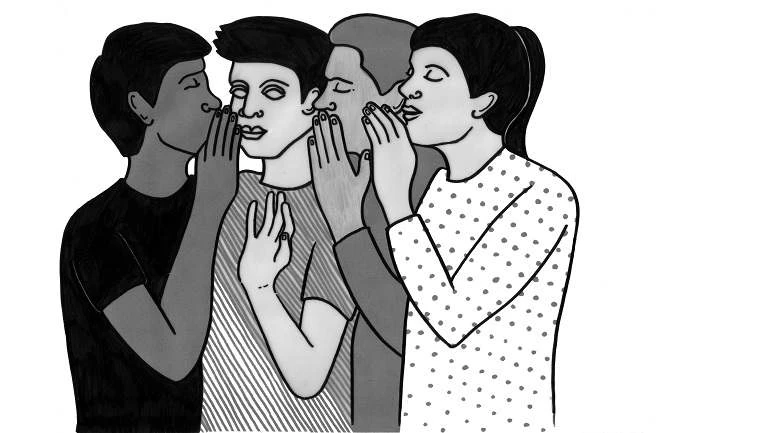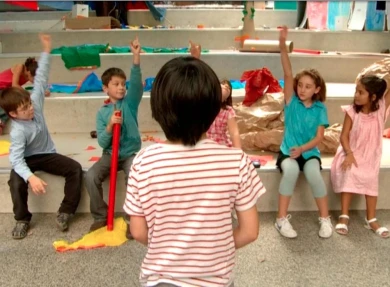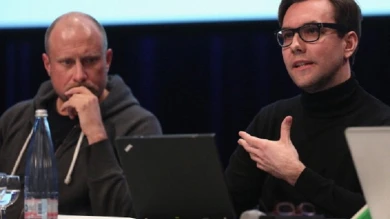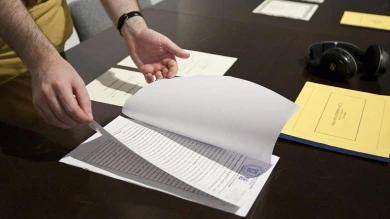-
Conversationalists
Conversationalists A
October 28, 2014 - 6:30 p.m., Sabatini Building, Auditorium
What, How and for Whom (WHW), Subtramas (Diego del Pozo, Montse Romaní, Virginia Villaplana) , João Fernandes and Jesús Carrillo discuss art as really “useful” knowledge.Participants
What, How and for Whom (WHW) is a curatorial collective founded in 1999. Based in Zagreb (Croatia), its members are Ivet Ćurlin, Ana Dević, Nataša Ilić and Sabina Sabolović, curators of the Really Useful Knowledge exhibition.
Subtramas (Diego del Pozo, Montse Romaní, Virginia Villaplana) is an art research project concerned with digital visual culture and collaborative production. Its members participate in the exhibition as artists and have devised the programme Action for Really Useful Knowledge and the itineraries of the exhibition’s mediation programme.
João Fernandes is the Deputy Director of Art at the Museo Reina Sofía.
Jesús Carrillo is the Head of Cultural Programmes at the Museo Reina Sofía and Senior Lecturer in the Department of Art History at the Autonomous University of Madrid.
Conversationalists B
November 20, 2014 - 7:00 p.m.
Contrabandos (the Independent Publishers Association of the Political Book) and the open and collaborative library Bookcamping engage in an open dialogue with the audience on the possibilities of publishing on the fringes of cultural industries.On the same day, at 4.40 p.m., both collectives will construct, with the help of those in attendance, a book “tree” on new political imaginaries. Location: Cuesta de Moyano, booth 20, Madrid.
Participants
Contrabandos is an independent publishers association focused on the promotion of texts and materials with a strong political and social focal point: Tierradenadie, Proteus, Hiru, Pol-len, Bellaterra, El Viejo Topo, Txalaparta, Ned, La Oveja Roja, Octaedro, Icaria, Laertes and Ediciones del Oriente y del Mediterráneo.
Bookcamping is an open and collaborative digital library for reviewing and downloading content in diverse formats. It aims to socialise reading and encourage a culture of sharing.
Conversationalists C
January 10, 2015 - 11:00 a.m.
Esta es una Plaza (Madrid), El Patio Maravillas (Madrid), La Casa Invisible (Málaga) and Observatorio Metropolitano de Barcelona will discuss the learning that emerges from socio-cultural experiences, politics and knowledge revolving around a new citizenship.Participants
Esta es una Plaza is an association set up around a public space, managed by local residents, where alternatives for outdoor leisure, exchange and socialisation are put forward.
El Patio Maravillas is a self-managed space located in the Malasaña neighbourhood of Madrid. It works towards a system of citizen participation and sets out to be a tool with which to build a new democracy. Different collectives are involved and offer diverse activities based on cooperation.
La Casa Invisible is a Social and Cultural Centre Managed by Citizens. Located in Málaga, it offers a space for cultural experimentation, training and new models of citizen management.
Observatorio Metropolitano de Barcelona is an open research group providing a critical analysis of urban commercialisation and the development of the public sphere in Barcelona.
Conversationalists D
January 22 enero, 2015 - 7:00 p.m.
Las Lindes (CA2M), the collective Cine Sin Autor and staff from the Museo Reina Sofía’s Education Department discuss the development of audiovisual prototypes in the spheres of education and creation.Participants
Las Lindes (CA2M) is a research and action group that works on ways of creating a new narrative of critical education practices, centring its research on education, art and cultural practices.
Cine sin Autor is a collective devoted to filmic art practices that sets out a new model of horizontal production for collective creation and without the authorship of film works.
-
Narrators
Narrators A
January 17, 2015 - 7:00 p.m.
The research and artistic production collective Declinación Magnética considers action that highlights popular and illegitimate knowledge.Declinación Magnética is a research and artistic production collective made up of visual artists, theorists and curators. Its activity focuses on audiovisual production – between fiction and essay – as a tool for reflecting on the colonial past and present within the framework of the current global crisis.
Narrators B
January 16, 2015 - 7:00 p.m. Jam Session Body-to-Body Readings
January 23, 2015 - 7:00 p.m. Improper Acts
February 6, 2015 - 7:00 p.m. Workshop on the manufacturing of DIY happiness
somatecxs. Research/production group
n acciones. bodies, narratives and memories
Jam Session Body-to-Body Readings
Friday 16 January, 7 p.m.
Chto Delat RoomThe Jam Session is an act of readings, both interlocked and polyphonic, that follows an open score. It sets out from the idea that narrations are not limited to orality, meaning that the body and bodies are not just one theme to read and enter into dialogue about, but instead participate in the reading. Everyone attending this activity is invited to explore the space, bodies and words, or the absence of them.
Improper Acts
Friday 23 January, 7 p.m.
Subtramas RoomImproper Acts are the last words in an old conversation, a dialogic project through the choreography of gestures, actions, sounds and experiences that question the long and complex journey undertaken by the Museo Reina Sofía as disciplinary architecture. By understanding the bodies and spaces in the museum diachronically, improper acts and forms of presence are evoked from the primitive hospital complex which are alien to its current use as an arts centre, but nevertheless, form part of the normative genealogy that constructs the edifice and its memory.
Workshop on the manufacturing of DIY happiness
Friday 6 February, 7 p.m.
Subtramas RoomFaced with the question posed by the Subtramas collective, How do we activate our imagination to create happiness that differs from the one organised by capitalism? Somatecxs offers a do-it-yourself manufacturing workshop of devices and prostheses facilitating happiness that appeals to creative thought.
To register, please send an email to programasculturales2@museoreinasofia.es. If you think of any device or prosthesis manufacture, you can tell us. A good-mood viewfinder? A holiday-weather simulator? An affection dispenser? A noise or complaint attenuator? Gluten- and glucose-free happiness pills? The most colourful prototypes will be chosen and built collectively.
somatcxs is a project stemming from the Museo Reina Sofía programme of Critical Practices “Somatheque. Living and Resisting in the Neoliberal condition”, run by Beatriz Preciado, in what is an approach to the modern body as a political and cultural archive.
Narrators C
January 31, 2015 - 6:30 p.m.
Me acuerdo… is a memorial collective in which diverse feminist and queer groups narrate the conquests of sexual diversity rights and the political learning processes in recent decades in Spain.Coordinators
Fefa Vila, cultural manager, social researcher and coordinator in the Department of projects and research within the EU at the Fundación FOREM. Her work is developed around the construction of gender in present-day societies from critical feminist positions. She also currently forms part of the queer work group in Madrid.
Elvira Siurana, secretary for the Spanish Feminist Party, co-director of the Publishing House "Vindicación Feminista" and editor of the theorist publication “Poder y Libertad”.
Guest artist
Floy Krouchi is an artist and electroacoustic composer that experiments with the sounds and silences in the world.
With the participation of: Ada Vila, Ana Rossetti, Anna Mezz, Begoña Marugán, Begoña Pernas, Carmen Jiménez, Carmen Romero, Cipri Martín, Cris del Toro, Empar Pineda, Esther Ortega, Eva Corredera, Flor Martínez, Isabel Cadenas, Isabela Vázquez, Izaskun Sánchez, Lucas Platero, Nieves Salobral, Rocío Lleó, Susana Sánchez, Tere Maldonado, Teresa Labrador.
Narrators D
All Thursdays and Saturdays - 7:00 p.m.
Readings and interpretations of a selection of incident reports on surveillance and mediation, along with reports on complaints, suggestions and congratulations compiled by the Museo team. These actions make the social dynamic that takes place in the exhibition space visible through the collection of multiple voices that pass through the museum. The diversity of visitors’ attitudes and the role of the museum staff identify them as receptive and active agents in the exhibition process, always placing them at the centre of this experience. In each session, due to take place in different exhibition halls, a range of combinations and variations will be carried out on the texts by students from the Museo Reina Sofía Study Centre. -
Instigators
Instigators A
January 17, 2015 - 11:00 a.m.
The collectives Cidespu, EnterArte and Acción educative, connected to the Marea Verde, carry out an intervention in defence of state education.Participants
Cidespu is an association of Citizens in Defence of Public Education in Móstoles (Madrid) that aims to safeguard the quality of public teaching in the local area.
Acción Educativa, made up of professionals from the sphere of education, works towards critical and creative education as a method of renewed teaching.
EnterArte is a work group comprised of teachers and an initiative that aims to bring art and schools closer together, introducing art education as an active learning method in the classroom.
Instigators B
December 14, 2014 First round: 11:00 a.m. Second round: 12:30 p.m.
MEDSAP-Marea Blanca from Madrid recount collective learning in their assertions in defence of public healthcare.MEDSAP (a Table in Defence of Public Healthcare in Madrid) is made up of a series of collectives and associations that uphold the defence of public healthcare and the active fight against the processes of privatisation in the Madrid healthcare system, demanding changes to the social and economic model.
January 8, 2015 - 6:30 p.m.
Yo SÍ Sanidad Universal (against healthcare exclusion and in favour of the collectivisation of knowledge) invites everyone to their monthly Agora , on this occasion about “Ethical and practical health”.Yo SÍ Sanidad Universal is defined as a movement of civil disobedience comprised of workers and patients from the National Healthcare system that demand universal health care and provide support for cases of healthcare exclusion.
Instigators C
November 22, 2014 - 7:00 p.m.
Eskalera Karakola. C/ Embajadores nº 52, Madrid.
The Possible care and domestic struggles workshop with the groups Senda de cuidados and Territorio Doméstico.Limited places. Further information and registration at: sendadecuidados@gmail.com
February 1, 2015 - 12:00 p.m.
The groups Senda de cuidados and Territorio Doméstico carry out an action for the social reorganisation of care.Participants
Senda de cuidados is a non-profit organisation aimed at building alternative decent work in the field of care. They use the idea of Cuidadanía, which in Spanish plays with the words Citizenship and Care, as they work towards building new lifestyles based on collective care.
Territorio Doméstico is made up of women from SEDOAC (Active Domestic Service), the Cita de Mujeres de Lavapiés group and the Agencia de Asuntos Precarios, who have found a space for sharing, analysing and proposing new forms of organisation among those that form part of domestic staff.
Instigators D
October 30, 2014 - 7:00 p.m.
María Laura Rosa holds an intervention on the artistic and activist practices (Argentina).María Laura Rosa is a researcher, teacher and specialist in art and gender. She is part of the research group “Women, politics and diversity in the ‘70s”, from the Interdisciplinary Institute of Gender Studies at the University of Buenos Aires, and the Argentinian Association of Art Critics.
February 4, 2015 - 7:00 p.m.
Edificio Sabatini, Sala Bóvedas
Acces through Calle Santa Isabel, 52
The group Península. Procesos coloniales y prácticas artísticas y curatoriales holds an activity on the critical questioning of colonial images.Limited seating. Registration in programasculturales2@museoreinasofia.es
Península is a debate platform on art, coloniality and curatorship related to Spanish and Portuguese history, their colonial processes and the latency of their power relations in the present.
Public action for Really Useful Knowledge

Held on 28, 30 Oct, 01, 06, 08, 13, 15, 20, 22, 27, 29 Nov, 04, 06, 11, 13, 14, 18, 20, 27 Dec 2014; 03, 08, 09, 10, 15, 17, 22, 23, 24, 29, 31 Jan, 01, 05, 06, 07 Feb 2015
A programme of actions and activities within the context of the exhibition Really Useful Knowledge, devised by the collective Subtramas (Diego del Pozo, Montse Romaní and Virginia Villaplana). These actions take place inside the galleries of the exhibition and feature participation from different social and cultural collectives.
The programme is made up of three types of actions, grouped under the name Conversationalists, Narrators and Instigators. Each typology encompasses actions linked, respectively, to the four questions that activate the mediation itineraries proposed by Subtramas: Why is learning together useful? (Route A), How do we activate our imagination to create happiness that differs from the one organised by capitalism? (Route B), What learning comes out of social movements? (Route C) and What can politically activate images? (Route D).
The Conversationalists present a series of conversations concerning the collective production of knowledge and experiences and their conflicts and effects.
The Narrators relate stories and text readings that compile a critical memory with the knowledge established.
The Instigators recount the conquests of social struggles via the strategies of representation used in present-day campaigns and citizen mobilisations.
The exhibition Really Useful Knowledge has been organised by the Museo Reina Sofía within the framework of the project “The Uses of Art” from the European network of museums L’Internationale.

Más actividades

Institutional Decentralisation
Thursday, 21 May 2026 – 5:30pm
This series is organised by equipoMotor, a group of teenagers, young people and older people who have participated in the Museo Reina Sofía’s previous community education projects, and is structured around four themed blocks that pivot on the monstrous.
This fourth and final session centres on films that take the museum away from its axis and make it gaze from the edges. Pieces that work with that which is normally left out: peripheral territories, unpolished aesthetics, clumsy gestures full of intent. Instead of possessing an institutional lustre, here they are rough, precarious and strange in appearance, legitimate forms of making and showing culture. The idea is to think about what happens when central authority is displaced, when the ugly and the uncomfortable are not hidden, when they are recognised as part of the commons. Film that does not seek to be to one’s liking, but to open space and allow other ways of seeing and inhabiting the museum to enter stage.
![Tracey Rose, The Black Sun Black Star and Moon [La luna estrella negro y negro sol], 2014.](https://recursos.museoreinasofia.es/styles/small_landscape/public/Obra/AD07091_2.jpg.webp)
On Black Study: Towards a Black Poethics of Contamination
Monday 27, Tuesday 28 and Wednesday 29 of April, 2026 – 16:00 h
The seminar On Black Study: Towards a Black Poethics of Contamination proposes Black Study as a critical and methodological practice that has emerged in and against racial capitalism, colonial modernity and institutional capture. Framed through what the invited researcher and practitioner Ishy Pryce-Parchment terms a Black poethics of contamination, the seminar considers what it might mean to think Blackness (and therefore Black Study) as contagious, diffuse and spreadable matter. To do so, it enacts a constellation of diasporic methodologies and black aesthetic practices that harbor “contamination” -ideas that travel through texts, geographies, bodies and histories- as a method and as a condition.
If Blackness enters Western modernity from the position of the Middle Passage and its afterlives, it also names a condition from which alternative modes of being, knowing and relating are continually forged. From within this errant boundarylessness, Black creative-intellectual practice unfolds as what might be called a history of touches: transmissions, residues and socialities that unsettle the fantasy of pure or self-contained knowledge.
Situated within Black radical aesthetics, Black feminist theory and diasporic poetics, the seminar traces a genealogy of Black Study not as an object of analysis but as methodological propositions that continue to shape contemporary aesthetic and political life. Against mastery as the horizon of study, the group shifts attention from what we know to how we know. It foregrounds creative Black methodological practices—fahima ife’s anindex (via Fred Moten), Katherine McKittrick’s expansive use of the footnote, citation as relational and loving labour, the aesthetics of Black miscellanea, and Christina Sharpe’s practices of annotation—as procedures that disorganise dominant regimes of knowledge. In this sense, Black Study is approached not as a discrete academic field but as a feel for knowing and knowledge: a constellation of insurgent practices—reading, gathering, listening, annotating, refusing, world-making—that operate both within and beyond the university.
The study sessions propose to experiment with form in order to embrace how ‘black people have always used interdisciplinary methodologies to explain, explore, and story the world.’ Through engagements with thinkers and practitioners such as Katherine McKittrick, C.L.R. James, Sylvia Wynter, Christina Sharpe, Fred Moten, Tina Campt, Hilton Als, John Akomfrah, fahima ife and Dionne Brand, we ask: What might it mean to study together, incompletely and without recourse to individuation? How might aesthetic practice function as a poethical intervention in the ongoing work of what Sylvia Wynter calls the practice of doing humanness?

Intergenerationality
Thursday, 9 April 2026 – 5:30pm
This series is organised by equipoMotor, a group of teenagers, young people and older people who have participated in the Museo Reina Sofía’s previous community education projects, and is structured around four themed blocks that pivot on the monstrous.
The third session gazes at film as a place from which to dismantle the idea of one sole history and one sole time. From a decolonial and queer perspective, it explores films which break the straight line of past-present-future, which mix memories, slow progress and leave space for rhythms which customarily make no room for official accounts. Here the images open cracks through which bodies, voices and affects appear, disrupting archive and questioning who narrates, and from where and for whom. The proposal is at once simple and ambitious: use film to imagine other modes of remembering, belonging and projecting futures we have not yet been able to live.

Remedios Zafra
Thursday March 19, 2026 - 19:00 h
The José Luis Brea Chair, dedicated to reflecting on the image and the epistemology of visuality in contemporary culture, opens its program with an inaugural lecture by essayist and thinker Remedios Zafra.
“That the contemporary antifeminist upsurge is constructed as an anti-intellectual drive is no coincidence; the two feed into one another. To advance a reactionary discourse that defends inequality, it is necessary to challenge gender studies and gender-equality policies, but also to devalue the very foundations of knowledge in which these have been most intensely developed over recent decades—while also undermining their institutional support: universities, art and research centers, and academic culture.
Feminism has been deeply linked to the affirmation of the most committed humanist thought. Periods of enlightenment and moments of transition toward more just social forms—sustained by education—have been when feminist demands have emerged most strongly. Awareness and achievements in equality increase when education plays a leading social role; thus, devaluing intellectual work also contributes to harming feminism, and vice versa, insofar as the bond between knowledge and feminism is not only conceptual and historical, but also intimate and political.
Today, antifeminism is used globally as the symbolic adhesive of far-right movements, in parallel with the devaluation of forms of knowledge emerging from the university and from science—mistreated by hoaxes and disinformation on social networks and through the spectacularization of life mediated by screens. These are consequences bound up with the primacy of a scopic value that for some time has been denigrating thought and positioning what is most seen as what is most valuable within the normalized mediation of technology. This inertia coexists with techno-libertarian proclamations that reactivate a patriarchy that uses the resentment of many men as a seductive and cohesive force to preserve and inflame privileges in the new world as techno-scenario.
This lecture will address this epochal context, delving into the synchronicity of these upsurges through an additional parallel between forms of patriarchal domination and techno-labor domination. A parallel in which feminism and intellectual work are both being harmed, while also sending signals that in both lie emancipatory responses to today’s reactionary turns and the neutralization of critique. This consonance would also speak to how the perverse patriarchal basis that turns women into sustainers of their own subordination finds its equivalent in the encouraged self-exploitation of cultural workers; in the legitimation of affective capital and symbolic capital as sufficient forms of payment; in the blurring of boundaries between life and work and in domestic isolation; or in the pressure to please and comply as an extended patriarchal form—today linked to the feigned enthusiasm of precarious workers, but also to technological adulation. In response to possible resistance and intellectual action, patriarchy has associated feminists with a future foretold as unhappy for them, equating “thought and consciousness” with unhappiness—where these have in fact been (and continue to be) levers of autonomy and emancipation.”
— Remedios Zafra

27th Contemporary Art Conservation Conference
Wednesday, 4, and Thursday, 5 March 2026
The 27th Contemporary Art Conservation Conference, organised by the Museo Reina Sofía’s Department of Conservation and Restoration, with the sponsorship of the Mapfre Foundation, is held on 4 and 5 March 2026. This international encounter sets out to share and debate experience and research, open new channels of study and reflect on conservation and the professional practice of restorers.
This edition will be held with in-person and online attendance formats, occurring simultaneously, via twenty-minute interventions followed by a five-minute Q&A.


